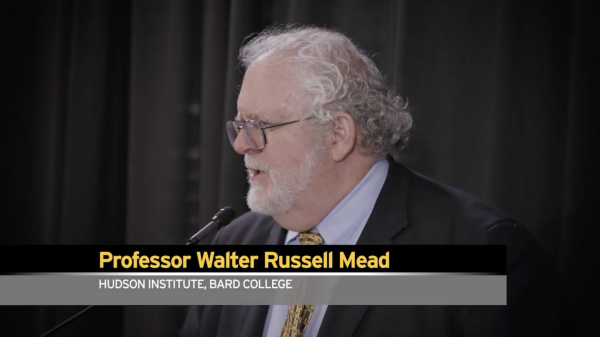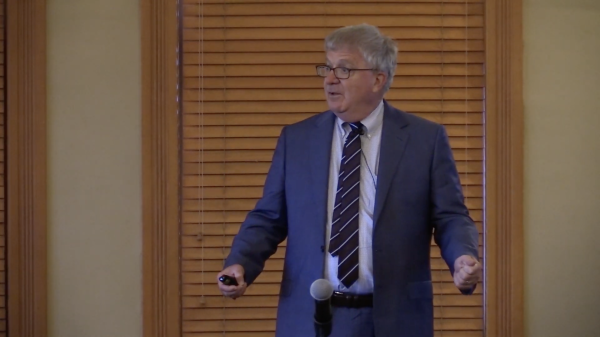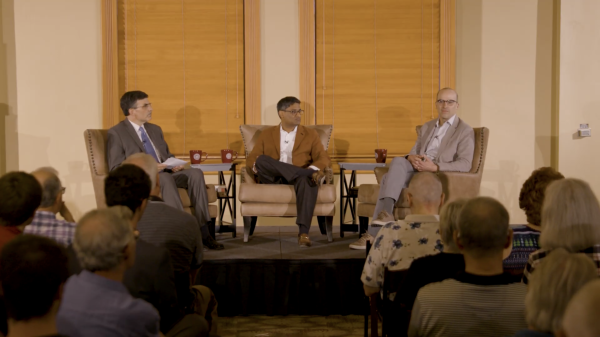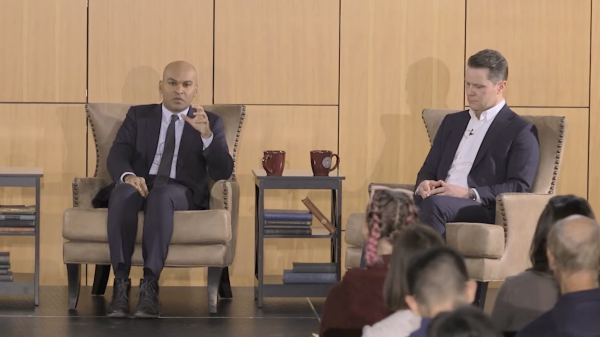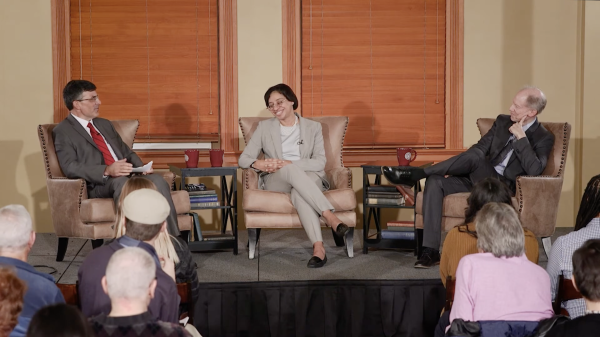
Citizenship and Civic Leadership in America
The Civic Discourse Project (2019-2020)
Mark Twain once said that “[c]itizenship is what makes a republic.” The primary purpose of civic education, as envisioned by the Founders, was to instill in our population the civic virtues, basic principles and practices of citizenship that would sustain a republic. What are the characteristics, advantages, duties, and responsibilities of a citizen today? Speakers include Robert Putnam, Yascha Mounk, David Leonhardt, Rich Lowry, Ramesh Ponnuru, and Shikha Dalmia.
Arizona PBS
The School of Civic and Economic Thought and Leadership has partnered with Arizona PBS to broadcast The Civic Discourse Project to the greater Arizona community. In its third year, the show has reached thousands of viewers across the Valley. Previous episodes can be viewed online on Arizona PBS' website.
Watch the series on Arizona PBS.
And check out the upcoming schedule of airings below. Episodes will be available online following each air date.
Upcoming episodes on Arizona PBS
“Citizenship and the African American Experience”
Sept. 17, 2020 at 7 p.m. MST
Angela Dillard, the Richard A. Meisler collegiate professor of Afroamerican & African studies at the University of Michigan, and Peter Myers, professor of political science and U.S. constitutional law, at the University of Wisconsin-Eau Claire, make the case that the Civil Rights Movement was marked by an intellectual and ideological diversity that incorporated a wide range of perspectives in debates about the nature of citizenship and the “proper” strategies for civil rights activism. Some of these threads stretch forward to our contemporary context, while others connect us profoundly to American founding principles.
“Communicating with Arizona Voters: The Insider’s View of the 2018 Gubernatorial Campaign and Beyond”
Sept. 22, 2020 at 11 p.m. MST.
What happens when a campaign is over? Daniel Scarpinato of the Ducey for Governor campaign, and Sarah Elliott of the Garcia Campaign, came to Arizona State University to share what they learned during the campaign and what they learned after the dust of the campaign had settled. The panel was co-moderated by The Arizona Republic’s Maria Polletta, who covered the 2018 gubernatorial race and currently covers state politics.
“Becoming American: Immigration and Civic Integration”
Sept. 29, 2020 at 11 p.m. MST.
Immigration has played an important role in almost every era in U.S. history, but it is often at the center of contentious political and economic debate. What does it mean to “become an American?” What responsibilities do new immigrants have to their newly adopted country? Reihan Salam, president of the Manhattan Institute, and Tomás Jiménez of Stanford University discuss the importance of civic integration for new immigrants to the United States and why it is necessary for both the new American and his or her new country.
“Citizenship and the Media: A Responsibility to Promote Civic Literacy”
Oct. 6, 2020 at 11 p.m. MST
What is the role of the media in the renewal of our understanding of ourselves as citizens and participants in the American political order? What is the responsibility of the media in the promotion of civic literacy? David Leonhardt, an op-ed columnist for The New York Times, and Ramesh Ponnuru, a senior editor at National Review, discuss the role of the media in elevating civic literacy in a way that contributes to informed active citizenship.
“Turning the Corner: What American History Teaches Us About Leadership and Civic Renewal”
Oct. 13, 2020 at 11 p.m. MST
Robert Putnam, Harvard University
“Civic Education and Renewal: Restoring American Civic Legitimacy”
Oct. 20, 2020 at 11 p.m. MST.
What is education for if not to prepare citizens for meaningful civic participation in the institutions of American government and society? How can we restore healthy civic participation and discussion to American democracy? What sort of education will the renewal of our civic institutions require? This panel featuring Peter Levine of the Tisch College of Civic Life at Tufts University and Wilfred McClay of the University of Oklahoma was a part of the Citizenship and Civic Leadership in America Conference at Arizona State University.
“Citizenship and Civic Leadership in America”
Oct. 27, 2020 at 11 p.m. MST.
In the final episode of this season, Rich Lowry of the National Review speaks on “Nationalism and America” and Yascha Mounk of Johns Hopkins University speaks on“ The Decline of Democracy: Standing Up for Liberal, Democratic Values.”
Watch the full events
Walter Russell Mead
Daniel Scarpinato and Sarah Elliott
David Leonhardt and Ramesh Ponnuru
Reihan Salam and Tomás Jimenéz
Angela Dillard and Peter Myers
In the news
Immigration authors examine nuances of assimilation at ASU talk
October 31, 2019 | ASU Now
When people move to the United States, their journey to assimilation is a complex process that involves change for everyone in the community, according to two authors who have studied this contemporary issue.
New lecture series aims to capture importance of civic participation
September 24, 2019 | ASU Now
The School of Civic and Economic Thought and Leadership will launch the third season of its “Civic Discourse Project” on Sept. 25, an annual lecture series designed to bring differing viewpoints to ASU to discuss the most pertinent issues of our time.
Campus discourse has been hijacked by a few radical 'cancelers,' says Robby Soave
September 5, 2019 | ASU Now
Frequent incidents over the past few years in which appearances by conservative speakers have been shut down or canceled at college campuses are an alarming threat to free speech, according to libertarian author Robby Soave.
